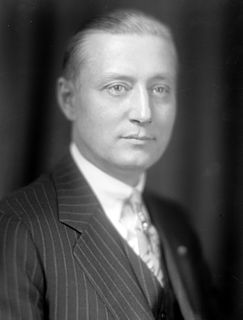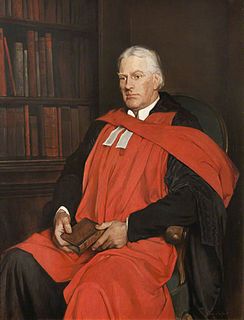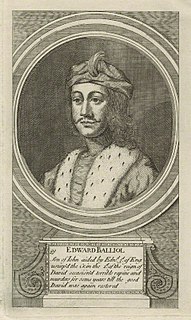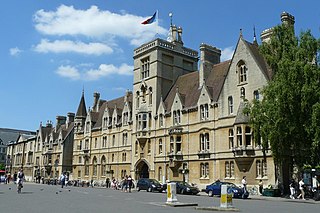Year 1332 (MCCCXXXII) was a leap year starting on Wednesday of the Julian calendar.

John Balliol, known derisively as Toom Tabard was King of Scots from 1292 to 1296. Little is known of his early life. After the death of Margaret, Maid of Norway, Scotland entered an interregnum during which several competitors for the Crown of Scotland put forward claims. Balliol was chosen from among them as the new King of Scotland by a group of selected noblemen headed by King Edward I of England.

Trinity College is one of the constituent colleges of the University of Oxford in England. The college was founded in 1555 by Sir Thomas Pope, on land previously occupied by Durham College, home to Benedictine monks from Durham Cathedral.

Martin Luther Davey was an American Democratic politician from Ohio. He was the 53rd Governor of Ohio.

The House of Balliol was a noble family originating from the village of Bailleul in Picardy. They held estates in England, granted during the reign of King William Rufus. Through marriage, they had claims to the Throne of Scotland. One member of the family, John Balliol, was named King of Scotland after the disputed succession following extinction of the Dunkeld line. John was deposed, leading to the First War of Scottish Independence. His son, Edward Balliol, also briefly controlled the Scottish throne during the Second War of Scottish Independence. Edward had no issue, and the direct line went extinct with him.

John de Balliol was a leading figure of Scottish and Anglo-Norman life. Balliol College, in Oxford, is named after him.
The Oxford University Mountaineering Club (OUMC) was founded in 1909 by Arnold Lunn, then a Balliol undergraduate; he did not earn a degree.

Dervorguilla of Galloway was a 'lady of substance' in 13th century Scotland, the wife from 1223 of John, 5th Baron de Balliol, and mother of John I, a future king of Scotland.

Buittle is an ecclesiastical and civil parish in Dumfries and Galloway, southwest Scotland, in the traditional county of Kirkcudbrightshire. It lies to the west of the Urr Water, between Dalbeattie and Castle Douglas, and extends from Haugh of Urr in the north to Almorness Point on the Solway Firth in the south. The main settlement is the small village of Palnackie.

The Davey Elm, Ulmus × hollandica 'Daveyi', is an English hybrid cultivar of unknown specific origin, generally restricted to the valleys of Cornwall. Its apparent south-west England provenance, along with its foliage and habit, suggest that it may be a hybrid of Wych Elm and Cornish Elm.

Henry was a 13th-century Augustinian abbot and bishop, most notable for holding the positions of Abbot of Holyrood and Bishop of Galloway.

Hugh de Balliol, Lord of Bywell, Barnard Castle and Gainford, was a 12th and 13th century nobleman. He was the son of Eustace de Balliol and Petronilla FitzPiers. Balliol was a supporter of King John of England during the Barons Wars of 1215-17.

The Gaisford Prize is a prize in the University of Oxford, founded in 1855 in memory of Dr Thomas Gaisford (1779–1855). For most of its history, the prize was awarded for Classical Greek Verse and Prose. The prizes now include the Gaisford Essay Prize and the Gaisford Dissertation Prize.

Francis William Pember JP (1862–1954) was a British lawyer and University of Oxford academic, where he served as Vice-Chancellor.
Thomas Good was an English academic and clergyman, and Master of Balliol College, Oxford. He is known as a moderate in and orthodox apologist for the Church of England, engaging with Richard Baxter and urging him to clarify a 'middle way'.

Edward Balliol was a pretender to the Scottish throne during the Second War of Scottish Independence. With English help, he briefly ruled parts of the country in three periods between 1332 and 1336.
Roger Leyburn was an English churchman and academic, Master of Pembroke Hall, Cambridge, archdeacon of Durham and bishop of Carlisle.

Sir John Wickens was an English barrister and judge.
Joseph Hunt D.D. was Master of Balliol College, Oxford from 1722 until his death.















